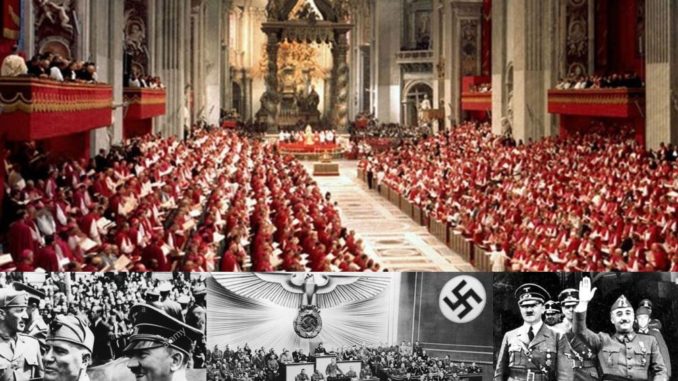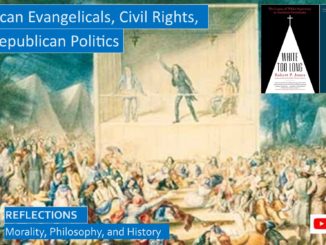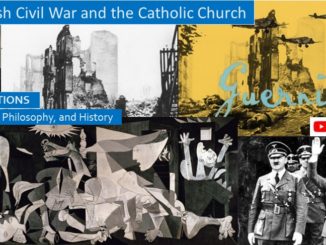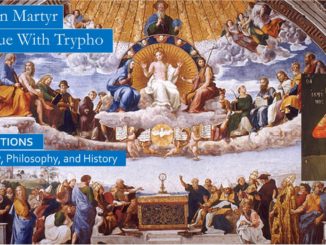
Many of the books I have consulted for my blogs on how Christians cope under Fascist regimes have interesting histories of their own, some even have these histories on their own Wikipedia pages.
This blog summarizes the series of blogs on Fascist Italy, Nazi Germany, Vichy France, the Spanish Civil War, and Apartheid South Africa:
This blog also references a blog on the Vatican II decree on Religious Freedom, which discards the medieval notion that the absolute monarchies and the Catholic Church are partners, and the modern notion that since the Communism is the enemy of the Catholic Church, and since Fascism is the deadly enemy of Communism, then the Church can tolerate Fascism. Vatican II embraces democracy and rejects fascism.
FASCIST ITALY AND THE CATHOLIC CHURCH UNDER MUSSOLINI
SOURCE: The Pope and Mussolini, David Kertzer, 2014
http://www.seekingvirtueandwisdom.com/mussolinis-fascist-regime-and-the-catholic-church/
Since Italy is overwhelmingly Catholic, the story of Catholicism in fascist Italy was very much about the relationship of the Pope and Mussolini. Unlike the Nazi regime, until the very end fascist Italy had a favorable, though sometimes strained, relationship with the Pope and the Catholic Church. For this blog we are using David Kertzer’s book titled the Pope and the Catholic Church, copyright 2014.
This book won the Pulitzer Prize, this was well-deserved. Since Italy is overwhelmingly Catholic, and since he Pope resides in Rome, the political dance between Mussolini and Pope Pius XI, and shortly before the start of World War II, Pope Pius XII, is a fascinating history, the book reads like a well-written novel. After Mussolini visits Berlin, and after Hitler visits Rome, we have a three way dance where the Pope is outnumbered and Mussolini falls under the spell of the madman Hitler shortly before the start of World War II.
In 2002 Pope John Paul II opened the Vatican archives of the wartime Pope Pius XI, which enabled him to write a much more balanced study of this fascinating history. I chose not to consult an earlier work, Hitler’s Pope, because it was too heavily slanted, possibly because the Vatican archives were not open when this book was written. Dr Wikipedia has an article debating the biases of this book,[1] plus some commentary of an earlier 1963 German play, The Deputy, that is seen by many to be too critical of Pope Pius XI, and some other works. Pope Francis has recently opened the archives of Pope Pius XII,[2] maybe we will see a new edition of the Popes and Mussolini in the future.
https://en.wikipedia.org/wiki/Hitler%27s_Pope
Unlike many books written in previous decades, David Kertzer’s book does not assume that the reader is familiar with the fine points of World War II history. We did not have to consult Wikipedia for background history very often in writing our blog based on his book.
HITLER SEIZES POWER IN NAZI GERMANY, HIS PERSECUTION OF THE CHRISTIAN CHURCHES
We consulted the main sources referenced in the Wikipedia article on Christians in Nazi Germany.
SOURCES: For the Soul of the People: Protestant Protest Against Hitler, Victoria Barnett, 1992.
The Catholic Church and Nazi Germany, Guenter Lewy, 2000, 1964
Complicity in the Holocaust: Churches and Universities in Nazi Germany, Robert P Ericksen, 2012.
http://www.seekingvirtueandwisdom.com/christians-under-hitlers-german-nazi-regime/
At the time of Hitler about 97% of Germans were registered as Christians, a third were Catholic, two-thirds were Protestant, most were Lutheran or Reformed Christians. The histories of how the Protestant Church and Catholic Church coped under Nazi Germany, though they overlap considerably, are two very different histories.
My main criticism of all three of these books is they assumed the reader is already acquainted with the detailed history of Nazi Germany. We felt compelled to include many references to the Wikipedia articles on the many key events that signaled turning points in the social history of Nazi Germany. We wonder why Victoria Barnett did not include a chapter with detailed biographies of the two leading members of the Confessing Church, Karl Barth and Dietrich Bonhoeffer.
We picked up some insights in the book Complicity in the Holocaust, which covers the history of both the churches and the universities during the rise of Hitler, consent and collaboration with the Nazi regime, and how these institutions processed their past during post-war de-Nazification.
Guenter Lewy’s book, The Catholic Church and Nazi Germany, is on its second edition, reissued to incorporate the Catholic archives opened by the Vatican on the role of the Catholic Church during World War II. Lewy also used the Gestapo archives as a source. We found this to be a compelling narrative on a specialized topic, the Catholic Church under Hitler.
We found Victoria Barnett’s book on the Protestant Confessing Church movement to be absolutely captivating. She used as a primary source countless interviews with many in the Confessing Church movement. Many people think that the Nazi death camps were mainly in Poland, most people do not realize that Nazi Germany had thousands of labor and death camps, there were many labor camps in Germany. The reason why Germany never asked their housewives to be Rosy Riveters was because they enslaved many Jews, political prisoners, French POW’s, and many Poles and Eastern Europeans in their labor camps. Although these labor camps had a high mortality rate, few labor camps in Germany had gas chambers disguised as showers.
Victoria Barnett includes many excerpts from these interviews. This is from the interview describing a German labor camp near a parish:[3]
When the prisoners were taken to their work place, one saw them- emaciated, wraith-like. Parish members and school children often put bread unobtrusively on the street curb, out of pity, so that the prisoners could grab it and get a little more nourishment. This happened even during the war, when food was rationed.
These interview excerpts relate how one German remembered how her lessons as schoolchild made her ashamed to be a German after her defeat:[4]
We had the feeling we had no future. We suffered the consequences of World War I, which had broken out before we could walk, and we thought that we would never have a chance.
She tells of her thoughts as a teenager of how Hitler caused many Germans to be proud of their Fatherland:[5]
We didn’t exactly have the wish for revenge, I don’t think it was about that, but we wanted to regain our national importance. We didn’t’ want to be somebody again- that sounds so much like ambition, it wasn’t that either- but we wanted to be German brothers alongside German brothers. Then along came this man who could hit things right on the target, and who stood for a united, great German Reich. That was the sweetest sound to our ears.
The interviews that described how Hitler was able to turn the German people against their Jewish neighbors are particularly chilling.
THE SPANISH CIVIL WAR AND THE CATHOLIC CHURCH
SOURCE: The Battle for Spain: The Spanish Civil war 1936-1939, Antony Beever, 2006, 1982
http://www.seekingvirtueandwisdom.com/spanish-civil-war-and-the-catholic-church/
Terminology: In the Spanish Civil War, the socialists and communists were called Republicans, while the rebelling Fascist generals were called Nationalists.
Why were Catholics and Christians so tolerant of Fascist and Nazi regimes in the interwar years? Simple, communists were ideologically sworn enemies of Christians, and Fascism was the sworn enemy of Communism, so Christians were inclined to support or tolerate Fascism. This was most certainly true: Lenin and the Russian Communists killed tens of thousands of clergy and millions of Christians, and the Spanish Republicans, aka Communists, killed thousands of priest, monks, and nuns.
The history of the Spanish Civil War was simple: Franco and the other Nationalist generals intended to stage a quick military coup, but only managed to control half the country, beginning a brutal three year civil war with massacres on both sides. Defeating the Fascists was a secondary priority for Stalin, his main priority was seizing control over the other Socialist parties in the Republican coalition.
There have been many fine histories written about the Spanish Civil War, but Beevor’s book, The Battle For Spain, was a number one best seller in Spain and is one the best histories of the war, and is very well-written and on its second edition using sources not available for the first edition.
Coincidentally, Beevor is also the author of a well-regarded book about the Battle of Stalingrad, coincidentally because like Stalingrad, the Spanish Civil War was a bloody war of attrition between two malevolent adversaries who cared little about the number of casualties in the battles.
VICHY FRANCE, CHAMPION OF NAZISM AND CATHOLICISM
SOURCES: Vichy France: Old Guard and New Order 1940-1944, Robert O Paxton, 2001, 1972.
Politics, Society and Christianity in Vichy France, WD Halls, 1995.
http://www.seekingvirtueandwisdom.com/vichy-france-regime-blog-1-pro-life-pro-catholic-and-fascist/
When Hitler and his tanks, troops, and Stuka dive-bombers blitzkrieged across France, reaching Paris in six weeks, the French leaders and people thought that Hitler, like Napoleon, would control the continent of Europe for decades. The patriotic socialist politicians of France fled into exile, leaving behind the conservative, pro-fascist, pro-Catholic, and pro-life conservative leaders who were eager to collaborate with the Nazis. Hitler thought it was advantageous to allow them to organize a puppet government in Vichy France, the agricultural region southeast of Paris.
For many decades after the Allies invaded the beaches of Normandy, expelling the Nazi invaders, the French, ashamed of their past, clung to the myth that few French collaborated with the Nazis, that most French eagerly supported the Resistance in resisting the Nazis.
Robert Paxton’s book, Vichy France, was both a sensation and very controversial when it was release in 1972, causing the French to revise their collective memory of the uncomfortable history of Vichy France. Quoting from his Wikipedia page:
“In the preface to the 1982 edition of Vichy France, Paxton disagreed with the assertion of his opponents that he had written in “easy moral superiority” from the perspective of a “victor”: “In fact [it] was written in the shadow of the war in Vietnam, which sharpened my animosity against nationalist conformism of all kinds. Writing in the late 1960s, what concerned me was not the comparison with defeated France but the confident swagger of the Germans in the summer of 1940.”
https://en.wikipedia.org/wiki/Robert_Paxton
After you read Paxton’s book you should also read the book by WD Halls to hear many interesting stories of how both Catholic and Protestant clergy and laymen collaborated with and resisted the policies of the Nazi regime and Vichy France during World War II. Halls had so many footnotes to Paxton’s history that it was abundantly clear that the Paxton book was the primary history of Vichy France.
CIVIL RIGHTS STRUGGLES IN SOUTH AFRICA
SOURCE: Long Walk to Freedom: Autobiography, Nelson Mandela, 2013, 1994.
http://www.seekingvirtueandwisdom.com/nelson-mandela-blog-1-a-childhood-in-transition/
We are using Nelson Mandela’s autobiography as primary source for this blog. You might say this is also his autohagiography, but this is fitting as Mandela lived the ideal of forgiveness and reconciliation and still inspires us today with his message of peace and understanding. Mandela lived his ideals. This is one of the most fascinating books I have ever read, it deals with so many historical transitions. We read not only about Mandela’s role in the struggle to transition from an apartheid system to a democracy, we also witness the transition from a benign colonial system to an oppressive apartheid system, and how a dirt-poor and barefoot African native like Nelson was able to take advantage of higher education to take their place in society. Nelson Mandela finished law school and passed the bar examination just before that window of opportunity was slammed shut for blacks in South Africa.
In the Foreword, Bill Clinton recalls one of his conversations with Mandela:
“I once asked Mandela to describe his long walk from prison to president.
– When you’re young and strong, – he told me = you can stay alive on your hatred, And I did, for many years.
Then one day after years of imprisonment, physical and emotional abuse, and separation from his family Mandela said – I realized that they could take everything away from me except my mind and my heart. Those they could not take away. Those things I could still control. And I decided not to give them away.”[6]
This book has its own Wikipedia page:
https://en.wikipedia.org/wiki/Long_Walk_to_Freedom
[1] https://en.wikipedia.org/wiki/Hitler%27s_Pope
Also, review the comments for this book on Amazon: https://www.amazon.com/Hitlers-Pope-Secret-History-Pius-ebook/dp/B000QUCO5I/ref=pd_lutyp_rtpb_1_1/145-5532705-4736927?_encoding=UTF8&pd_rd_i=B000QUCO5I&pd_rd_r=5e89cb6e-f54f-4177-aaac-2973efdf9248&pd_rd_w=V8OWk&pd_rd_wg=6ZNwS&pf_rd_p=a6e2c5ee-564b-4b8f-b08c-386e20fcecea&pf_rd_r=72F57N4DW9GEPDE1TY3C&psc=1&refRID=72F57N4DW9GEPDE1TY3C
[2] https://en.wikipedia.org/wiki/Pope_Pius_XII#Views,_interpretations_and_scholarship
[3] Victoria Barnett, For the Soul of the People, Protestant Protest Against Hitler (New York, Oxford University Press, 1992), p. 101.
[4] Victoria Barnett, For the Soul of the People, p. 27.
[5] Victoria Barnett, For the Soul of the People, pp. 27-28.
[6] Nelson Mandela, “Long Walk To Freedom, an Autobiography,” (New York: Little Brown and Company, 1994), Forward.




1 Trackback / Pingback